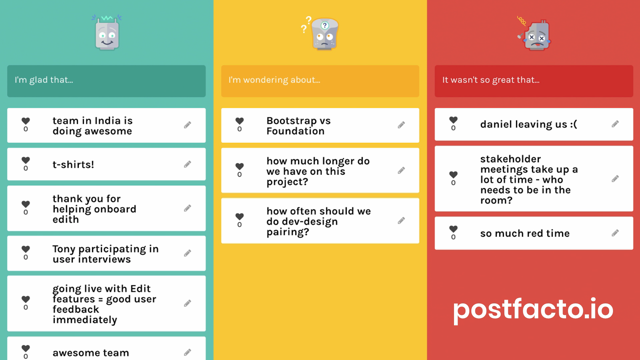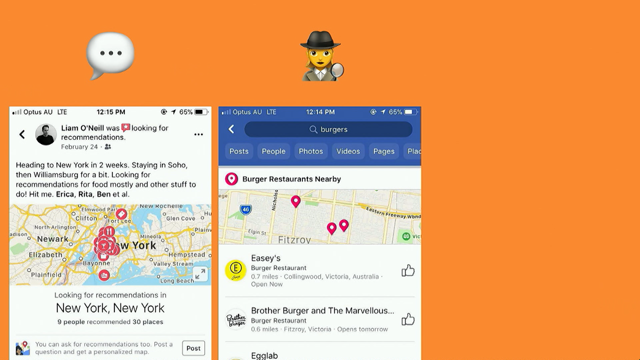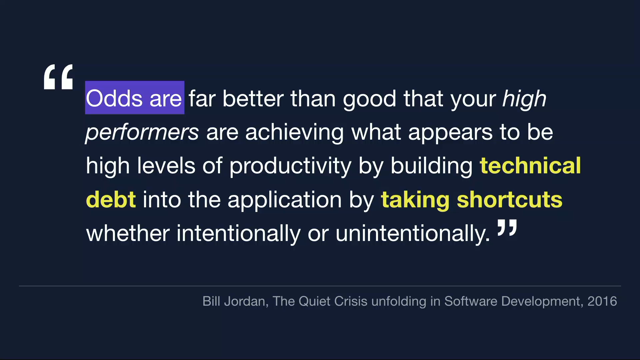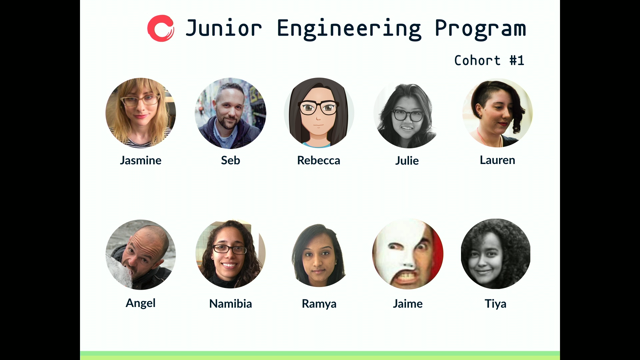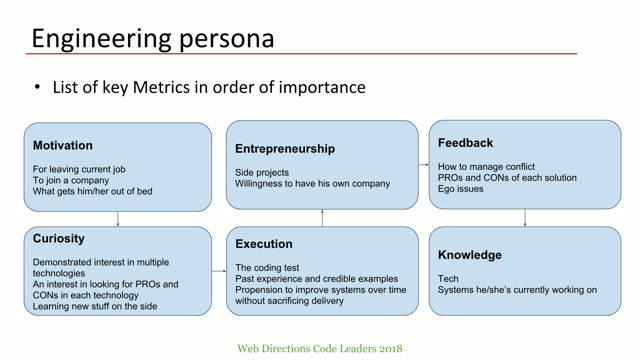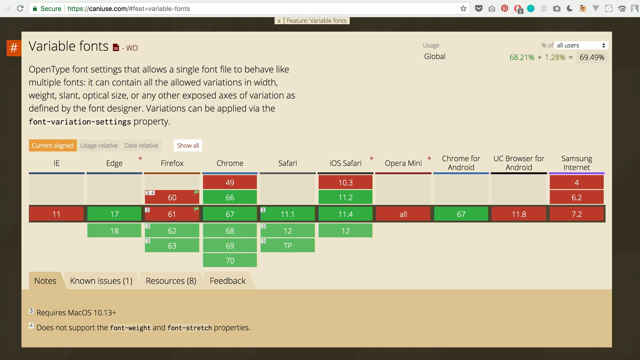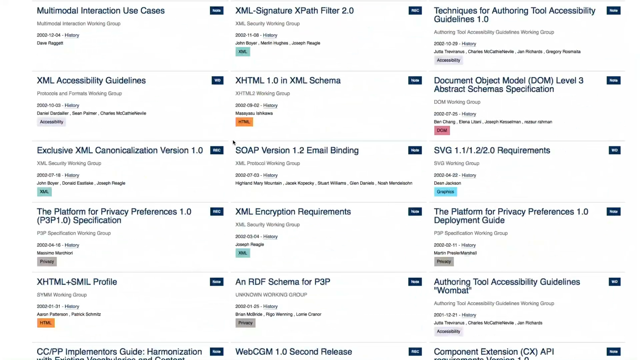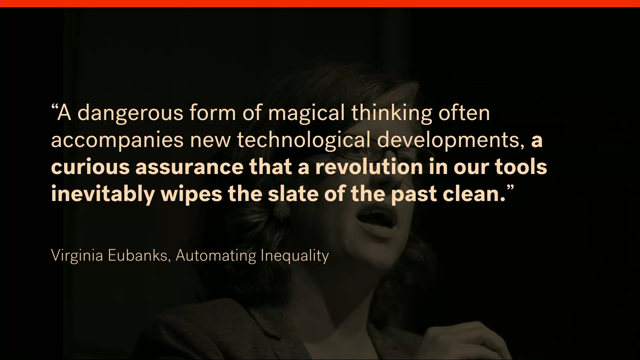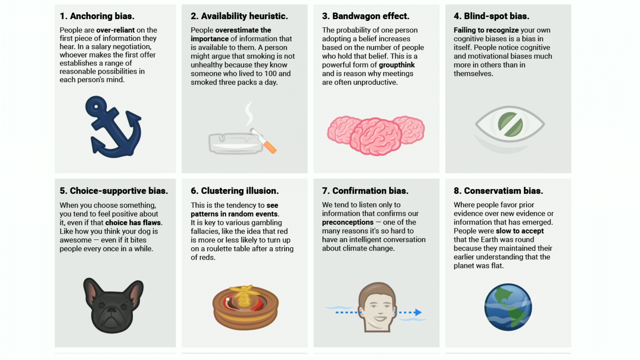Data Driven Culture – Leadership & Growing People
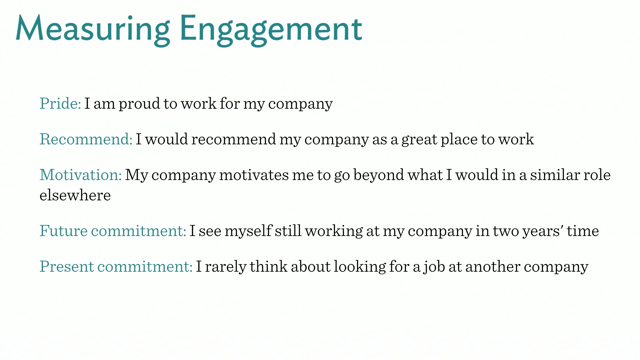
(upbeat music) - Alright, so what I actually want to talk to you about today is this.
What do engineers want? I thought it would be really fun, knowing that I had this talk coming up to go and ask all the engineers we had in our organisation to see what they would answer for that.
And they actually had some really great answers. So, one of them said this.
(scattered applauding and laughing) A single browser that just works.
But where's the fun in that? Yeah, you don't like that one as much.
We've got front end developers in this room I think. And this is my personal favourite.
So they just want coffee and code in between it. But when we think about what our data shows us, all of those answers are actually correct.
But none of them are things that are really gonna' move the needle.
We can give our developers lots of coffee, we can have everything work in UTC time, but none of those things are gonna be the things that actually create true engagement and make engineers want to work in our organisation for a long period of time, and really bring their best self to work every day, and be motivated to go above and beyond.
So when I look at our data that we get from all of our Culture Amp surveys, we can break down and look at what are the top things that drive engagement for engineers.
And these are the top things that we find.
They want to know that there's a motivating vision, something they can really get behind.
They want to have confidence in the company leadership. They want development opportunities.
They want to be able to learn in their roles, and they want career opportunities.
And these are the things I'm going to talk about today. Now first of all, I want to talk to you about how we measure engagement.
So when talk about what these things are driving, there are five questions that we ask, there's five things we look at in terms of what engagement is.
First of all, pride.
Are our engineers proud to work for our companies? Would they recommend them to somebody else outside of the company? Are they motivated to go above and beyond what they would elsewhere? And then how committed are they? Do they see themselves staying with the company for the next couple of years? And I know I have a pretty discerning audience here, so I will need to give you a little bit more information about the data I was using so that you actually know that you can trust it, that you can take some of these insights and believe in what they're telling us.
Now our surveys are designed by organisational psychologists and data scientists.
We spent a lot of time thinking about the questions that we ask and how we are asked them in the right ways to get really good, true answers from them. We also have over half a million responses that we use to build up our benchmarks now. So this is not coming from one or two surveys from a couple of companies.
It's really a large bank of data.
Large enough that we can draw some real insights that help us to see patterns.
And it is global data.
So most of our responses come from the US.
About two thirds.
But we have about a third of them that come from Asia, Oceania, Europe.
So they're pretty representative of most of the kind of companies that all of us are working in.
It's a high percentage of what we would call new tech companies, so companies that have been built up around technology. Technology is like the first thing that is driving the business as opposed to more traditional companies which have had to incorporate technology.
So these are the four things that we've found over all, over all that data really motivate engineers to be highly engaged.
And so let's talk a little bit about leadership. The first two things on that slide relate mostly to leadership.
And I want to share the scores with you.
This is from our benchmarks, and these are the scores that we see in answer to these four questions that we ask about leadership. The top one is one of the top motivators for engineers, whether they have confidence overall in the leaders, in the top level leadership in the company. We also ask whether they believe that leaders demonstrate people are important to the company's success, whether leaders communicate a motivating vision, and lastly that they keep people informed about what's happening.
Now these scores are pretty high, right? High 70s, I wouldn't have minded getting that on some of my exams back at school.
But if you look at it another way, that means that a third of people in our companies, nearly a third are telling us that the leaders aren't keeping them informed about what is happening. They don't really know what's going on.
We've got a quarter of our people telling us they don't even have confidence in the leaders who are supposed to be running the company. And these are the things that really make people feel like they want to come to work every day, they want to give their best to the job.
So we need to think about these things.
You know, one in four of your staff could be feeling that way.
Now some of the most engaged companies, just to kind of really drive this point home a little bit, we separate our data, we look at the top 10% of companies. And just to kind of tell what is the real impact of these things.
We see 14 percentage points difference in the scores between the most engaged top 10% of companies, in terms of engagement, and the average across all of the companies. So the ones who are really doing well are doing these things around leadership really, really well. They're getting really high scores, almost 90% in some of these cases.
And one other thing that we find makes a difference to people is smaller companies. So we look at the size of the company, and what we see is that where you've got less than about 200 employees, we actually see much better scores in these leadership questions.
They're 15% more likely in small companies, to have confidence in their leaders.
They're 10% more likely to really believe that leaders are demonstrating that their people are important to company success.
So if you're in a small company, great, right? Your job's done already.
We think that a lot of this is to do with the fact that in a small company, you can be a lot closer to the leaders.
You get a lot more contact with the leaders. I actually sit opposite the CEO.
When I first started at Culture Amp, I used to sit opposite him, right next to our CTO, so they were people, they were people I talked to every day.
I really felt like I could have confidence in them, because I knew who they were and I could relate to them. So I want to talk about some of the things that we can do to kind of create that connection with our leaders. If we are in larger companies, we all want to get bigger than 200, well most of us, many of us do.
So what are some of the techniques we can use to bring our leaders closer to the people in our company? At Culture Amp we use this, it was an idea that came from one of our clients. We created this thing that's called a Book of Signs and it's kind of a book of signposts, I think we think of it as.
And it's something that describes all of our company values and when somebody first arrives at the company, we go through this Book of Signs with them and their manager will sit and go through and talk about our company values.
And after that, they meet with some different people across the company.
So we ask them to meet with three, we call them value story tellers.
And these people talk about how our values really manifest themselves in our day to day work at Culture Amp, how we live them, talk about examples of things that we've done that are really like, where we've lived the values in our day to day work.
So what this is doing is taking these values, three of them were developed by our leaders in the very, very early days.
And the last one which was added recently, it enables people to kind of understand where we're coming from as a company.
What drives, right from our very leadership, right the way through the company, what's driving us? What are these things that are really kind of the heart and soul of Culture Amp? So it creates this connection to the overall company, they can understand how these values help us to shape our company vision.
Another thing that we've done, we steal all these ideas from our customers basically, we go and find out what they're doing.
This is another one that came from one of our customers. There's different ways that you can implement this, some people have done something where they create a part of their all hands meeting, they have a period of time set aside where leaders will answer any questions that anybody can ask.
The way that we do it at Culture Amp is we create a slap channel for our CEO and he will answer any questions.
He promises that no matter what, if you ask a question there, he'll give you an answer. And, we also have an anonymous survey, so if you don't want him to know who you are when you're asking, we call this survey Ask me Anything.
And he publicly answers all of the questions in this slap channel.
So here's an example.
And I wanted to share this quote from some people, this is a real example, some real people at Culture Amp in our slap channel. And they really appreciate the realness of his responses. There's some questions that get asked that are really quite difficult.
And because this kind of creates this vulnerability that he has to answer the questions, make himself vulnerable, sometimes he doesn't know, it makes him a lot more relatable.
It makes it easier for us to have confidence in him, he's a person, we can relate to him, we can have confidence in where he's going with the company. He's not pretending to know everything, and if there's things we don't know, things that the company's doing that we feel like we're not aligned with, we've got plenty of channels to be able to ask and find out. And I think this has been a really positive thing in helping us to be more connected to our leadership. Another thing that many companies do, not something we've done yet, is to host an employee conference.
So you have everyone brought together.
A lot of remote companies, Safety Culture up in Queensland do this, bring everyone to take over Townsville, which sounds pretty cool to me.
I haven't been to Townsville though.
Also, Airbnb have a conference that they run, it's called One Airbnb.
And they bring all of their staff together, and it's very branded, so each of the days, each of the activities, incorporates their brand.
They have something called an Air Fare where they have various stalls where you can go and find out about all the different departments in the company, what are they doing? What's their strategy? What are they focused on? They have this idea of an Air Share, where they have a morning of people doing presentations, so that they can learn from other people across the company. It's run over several days, and the whole idea is to bring people together to create connection and to create alignment. They also take their survey results, obviously, and they ask everybody to divide into groups and think about what are three things that we could do within this company, to improve on the things that we're not doing so well in, in our survey? So everyone can feel involved in what the company's doing, can understand why they're doing what they're doing, and kind of creating that alignment.
Now I wanted to call out this key difference, because one of the things we do see across all of our data, is that women tend to have a different experience to men. Emma talked about this earlier.
When it comes to women, a lot more of us are leaving the industry more quickly than men, and when you look at what the data's showing us, if these are the things that are creating engagement in our engineers, women are getting a better experience, a better experience, I wish they were, not such a good experience.
So women on average are 8% less likely to say they have confidence in the leaders. They're 11% less likely to agree that leaders believe people are important to company success. And as well as the general gender gap, we think that there are fewer women in higher up positions. So in general, the people in the more senior positions have much better contact with the CEO, or with the leadership of the company.
And so because we're not as well represented in those senior positions, this is partly what is contributing to this gap in the data. I wanted to also share this data which is comparing people who have stayed in the company and who have gone on to leave.
It's not from exit surveys, what we actually do is to look at how you answered the questions differently between the people who stay with the company a year or a year and half, and then the other group of people who actually go on to leave the company within a year and a half. And there's a massive difference.
People are pretty honest in these surveys, they actually answer very differently about whether they see themselves staying in the company. A large number of the people who say they don't, do then go on to leave.
And what you can see is that around these leadership questions there's some massive gaps between the people who go on and leave and the people who stay.
By improving how we're aligning people to our leadership, and in giving them more confidence in our leaders, we're not only creating better engagement, but we're helping to keep people in the company, we're really having an impact upon our retention. So what about managers? I know there's quite a few managers in the room. I looked at the questions in the survey that relate to managers and if you rank all of the questions in terms of how strong a driver they are for engineers, there are 48 and this is where the ones for managers fall. All the way down to 48.
This is not to say that managers can't make a difference. And what we've seen, is that when you have strong leadership in a good company, and you have good development opportunities, good managers make a difference.
But if you don't have those things, no matter how good of a manager you are, often it doesn't move the needle very much. So these are the things the leadership and growing people, which I'll talk about in a minute, these are the things that we really need to think about. So in summary, leadership is really strongly linked to engagement. Smaller companies score higher on confidence in leaders and leaders demonstrating that people are important. The top drivers for engineers are whether leaders communicate a motivating vision, and whether they're confident in their leaders. And the scores are generally lower from women. And some things we can do, try a Book of Signs for your company values for for new employees to help them understand how the company works. Connect employees to the leaders by internal communication channels, whichever ones work for you.
And consider a cross company conference.
Now three and four on here were around development opportunities and career opportunities.
So I'd like to move on and talk about those a little bit. If we look at what the scores are for the questions we ask around growth and development, whether people believe there are good career opportunities for their company and whether people believe their company is a great company to make a contribution to their development, so are they actually learning in their current role? Now again we've got over a third of our people saying that in their current company they don't believe that there are good career opportunities.
And that's a huge percentage.
That's one in three people in your companies who doesn't believe that they can really get anywhere apart from their current job.
This is a huge factor in people leaving.
We also see about a percentage point difference of five or six percentage points between women and men.
So again, as Emma mentioned earlier, women often don't receive the same career progression. They don't experience the same opportunities. And we see this coming through in the data. People who did actually go on and leave the company were 38% more likely than the people who stayed to feel that there wasn't a career opportunity. This stuff is really impacting our retention. If we can give people career opportunities, it's a massive advantage in keeping them in our companies. So let's think about some ideas that we can implement. One company really worked hard, who had some bad feedback around this, that they were not doing as well as they could on providing people career opportunities, decided to make sure that they made all the opportunities available.
People were saying that they just didn't know, like I don't see any opportunities for me.
So they built an internal jobs board and they built a handbook so they made it very clear, these are the steps that you go through if you decide you want to change your role, this is how we can support you to do that.
And one of the effects of this, is that it makes it okay.
In a lot of companies, a lot of teams, managers don't want to lose people, because they're scared, who's going to do the role if that person leaves? And you try and kind of hold people in your team. But the knock on effect of this is ultimately they go and look elsewhere for a role.
So if we can actually encourage it within our organisations and give people these opportunities in teams, at least in the same company, and make that okay, make that something that we can talk about openly, and that's something that can really help build engagement and retention.
Something that Yelp do very well, is that they provide people stretch roles.
It's a really hard thing to do, because the thing with giving somebody a stretch role is that they are much more likely to fail.
So Yelp have put a lot of focus on learning and development and they've created these stretch roles where they really accept that the person going into that role has a high chance of making a lot of mistakes. And they make that okay, and they give them them support to learn from their mistakes and to move forward. And if you want some other ideas around how to help people develop, something we do at Culture Amp, I know a lot of companies provide an amount of money, probably a lot of people here have spent their allocation on coming to Work Directions to learn, but something we do a little bit differently is to actually give people personal coaching. One of the reasons I joined Culture Amp initially was I'd never really had the opportunity to have exec coaching.
That sounded really cool and really fun.
And just having somebody who was just coaching you one-to-one makes a massive difference.
We've allowed people to choose to have coaching at anything that they like so for most of us it's work related, but we've also done a lot of life coaching. There's coaching in resilience and other kinds of subjects that can help you in your life as well as your work. But this is something that really makes people feel like the company is investing in them, in them personally, not just giving them a small amount of money, or a large amount of money, to spend on conferences, but also personal learning that's tailored for you and what you need.
So just to summarise, the third and fourth highest drivers for engagement for engineers are related to learning and development. The scores on learning and development questions again, from women, are generally lower than from men. And we see it strongly linked to retention. So some ideas we can try are stretch roles, we can have an internal jobs board and really define our processes that allow people to transition internally and make that okay. And we can also have personal coaching as an idea, as an alternative to the traditional allocation for training.
Now at Culture Amp we make a lot of this research available online, it's free, so I would really encourage you, if you found any of this interesting, hopefully some of it you did, I would encourage you to check out our website. We've got a lot of whitepapers, we've got some eBooks, there's a lot of benchmark reports which you can sign up for and have sent to you.
And there's a lot more data than what I've shared with you today that is really useful in understanding how people are engaged and what people need in order to stay with your company and to be more engaged in their work.
And I'm done. Thank you.
(applauding) (upbeat music)
Company Culture and Employee Engagement aren’t just popular buzzwords – really understanding what makes your teams tick can lead to a significant difference in company performance, profitability, customer satisfaction. At Agile Australia in 2016 I presented a Culture Manifesto derived from data from over 100,000 survey responses from engagement and exit surveys at more than 150 companies, many of them in the New Tech space, and explained why factors such as effective company leadership, and learning and development, can have a real impact on improving engagement and reducing turnover.
In this talk I will dig in to the topics of leadership and growing people, with updated insights from more recent data, and explain some of the differences we see in groups such as engineering teams, and at different stages of company growth. I will present stories from our own company and other case studies, where people have taken action and the differences we see.
You will appreciate the importance of effective leadership and developing people and how it contributes to engagement; gain insights into the drivers of engagement and turnover; and also hear about the things that we expect would make a difference, but the data proves us wrong!

